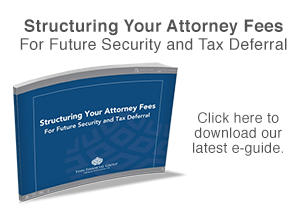Structured Settlement Talk: You, Me and Those Darned Assumptions
A few days ago, an attorney client-friend I hadn’t spoken with in awhile called for some structured settlement proposals.
“Business must be terrible since rates are so bad, right?”
I acknowledged some cases recently where clients who were excellent candidates for guaranteed tax-free income desperately needed cash to stave off foreclosure, support a laid-off spouse, make up for lost savings, etc.
But he was surprised when I told him that our overall business activity is about on par with activity in the pre-Recession days before money seemed to evaporate overnight. After all, some people will always choose guaranteed, tax-advantaged income regardless of what the rest of the economy is doing. They’re just wired for safety and security.
“How can that be with interest rates so low?” he wondered. “Structured settlements can’t be paying more than, what, 1 or 2 percent?”
I smiled. This was not the first time I had heard this.
Oscar Wilde Was Right*
His client was a 55 year-old male whose marginal income bracket was still quite high because both spouses, fortunately, still worked. He planned to continue working to his normal retirement age of 65.
Furthermore, this person’s 401(k) had taken such a hit the past few years that he vowed never again to buy another stock. He was coming to that point in life where he needed to shift his risk tolerance anyway so had asked his attorney, a wise money-man himself, if he knew of anything “sensible” he could do with his settlement money.
I ran a quick quote that revealed his client could receive guaranteed lifetime income beginning at age 65 (a 10-year deferral) that resulted in a 4.35% tax-free rate of return based on full life expectancy. Factoring the client’s high estimated tax bracket into account, his tax-equivalent yield was over 7.50%.
It’s worth noting that the “real” (inflation-adjusted) rate of return for the S&P 500 from 1950-2009 is 7.0% according to data collected by Robert Shiller from Yale University for his book Irrational Exuberance.
Surprise!
The attorney was amazed! This was significantly better than he had been expecting. So much so, that he realized that maybe it was time for him to start thinking about resuming the structuring of his fees going forward.
I told him I was glad I could change his assumption and assured him I’d be here whenever he was ready to resume structuring his fees.
Thoughts From a Bond Guru
Clients may wish to heed the insights of “Bond Guru” Bill Gross, manager of the world’s largest bond mutual fund. In a recent Money magazine article, he talks about how people need to adjust to the “new normal,” which he defines as “an era of slow growth and lower returns on stocks, bonds and everything else.”
Click HERE to view the article “What the bond guru sees coming”
Gross essentially suggests that people cut their return expectations in half. Instead of expecting 10% returns on stocks, expect 5%. Expect 4% on bonds. Etc.
Final Comments
In the structured settlement business, we’re telling clients who will need money in the very short term they should NOT structure that portion of their settlement proceeds. (Exceptions: Some taxable settlements, attorney fees and Structured Sales).
But for those who seek long-term financial security, we have yet to find anything that compares to the benefits of a properly crafted structured settlement. The tax-advantage coupled with the uber-secure nature of structured settlements make for a terrific combination.
Tough as it is to get used to this “new normal,” those who adapt will surely survive and thrive. And we look forward to being here to help you through the transition.
Posted: July 20, 2010 | by dan | Category: Blog, Newsletter, Structured Settlements

















